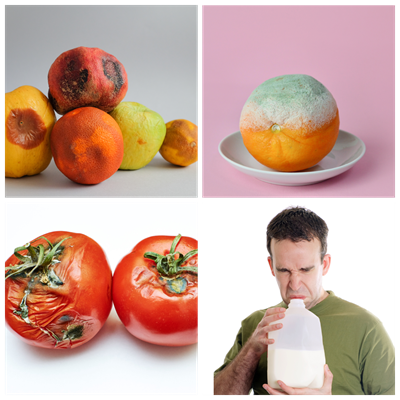PDF chapter test TRY NOW
Food spoilage is an undesirable or unacceptable change in the normal state of food which makes it not suitable for human consumption.
When hygiene is not followed and neglected, the pathogenic microorganisms cause food spoilage.
Food spoilage is caused due to poor hygiene and the negligence of personal hygiene.
Food spoilage is a result of the growth and biochemical activity of these microorganisms. The microorganisms that are associated with food spoilage include moulds, yeast and bacteria. Signs of food spoilage include:
1. Changes in appearance
2. Changes in colour
3. Changes in texture
4. Changes in odour and taste

Signs of food spoilage
Factors that are responsible for food spoilage:
1.Internal factors:
- Enzyme activities that include chemical reactions. These reactions take place inside foods that involve oxygen (oxidation of fats and oils).
- It can also be activities that are caused due to endogenous enzymes present in food (fruits, vegetables or animal origin).
- The moisture content of the food also causes spoilage. Foods that have high moisture content spoils faster.
2. External factors:
- Adulterants in food
- Damage due to pests (insects and rodents)
- Mechanical damage to food
- Contaminated utensils and equipment's
- Unhygienic cooking area
- Lack of storage facilities or improper storage
- Inappropriate transport and handling
